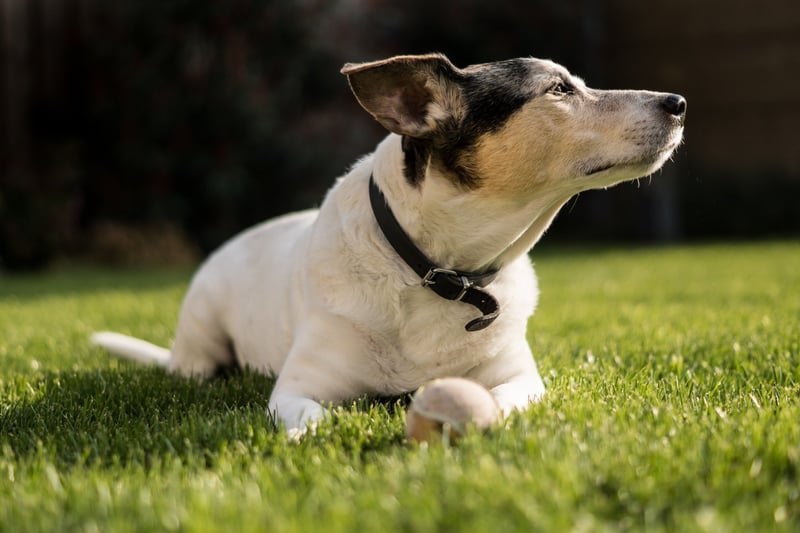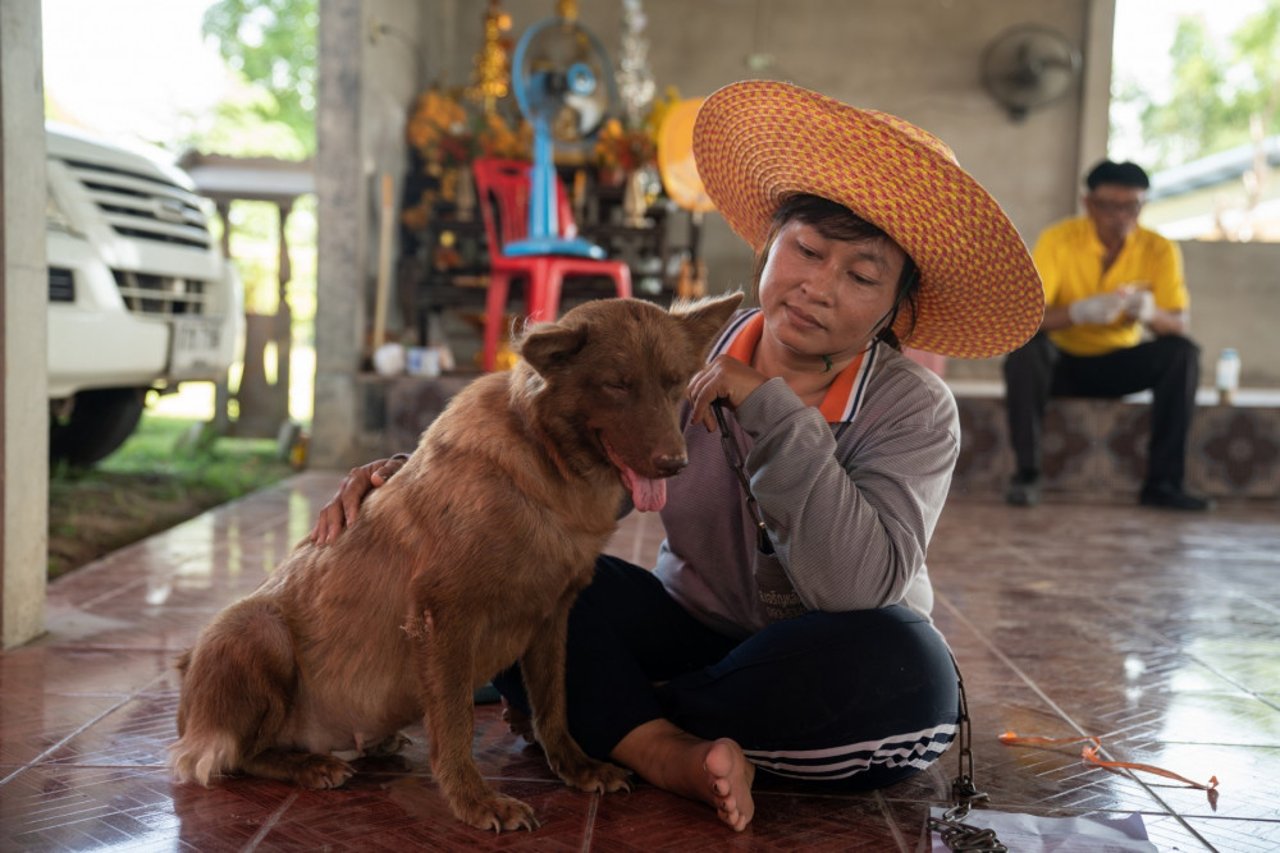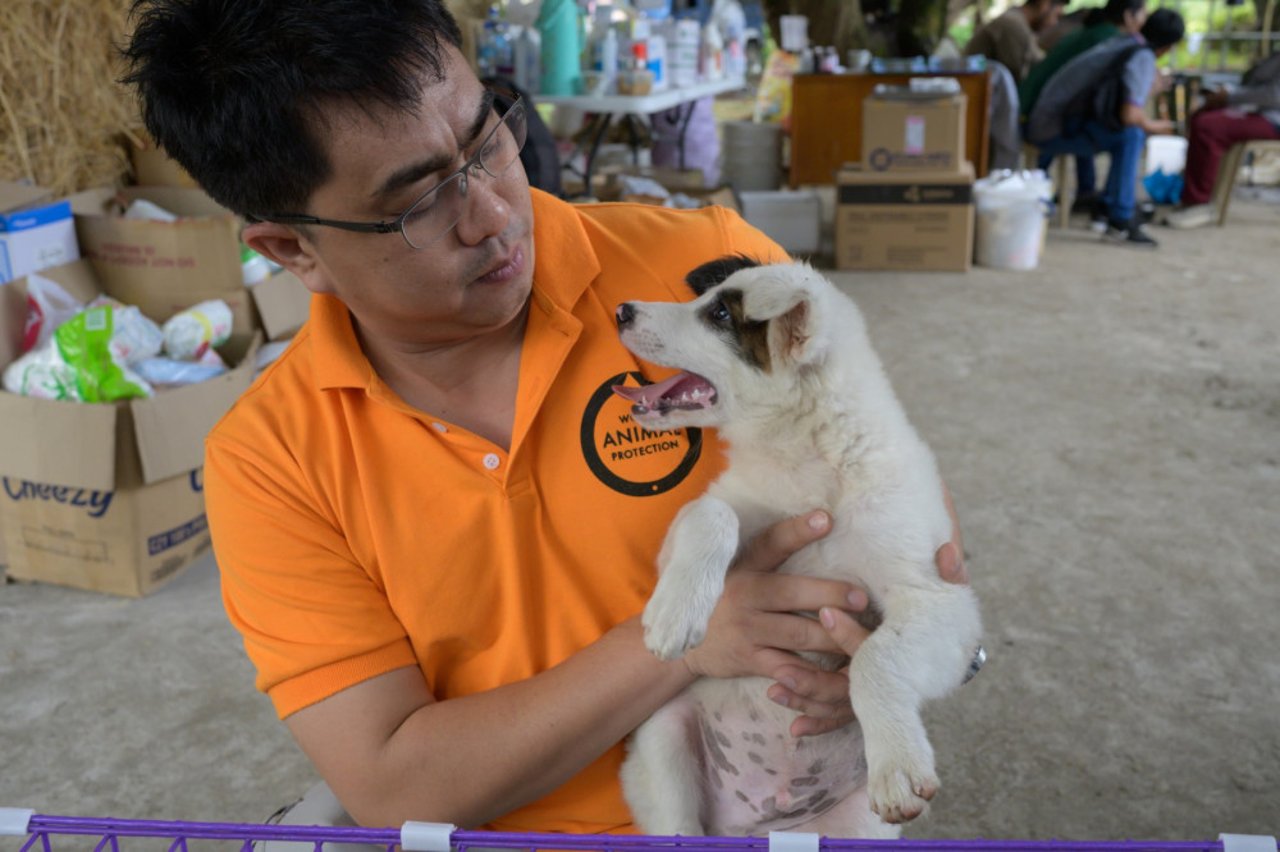
Everything you need to know about coronavirus and pets
News
The current COVID-19 pandemic is causing fear and uncertainty for many. It is also a threat to companion animal welfare as some owners worry that pet dogs and cats could spread the virus. We’ve got the answers to all your questions about how to keep yourself and animals safe
A dog we vaccinated on a rabies vaccination drive in Sisaket, Thailand
Let's protect our pets
There is no evidence that pets can be a source of infection to other animals or humans. We highly recommend all pet owners take care of their animals and keep calm. Pets shouldn't be abandoned under any circumstance and, as always, there's absolutely no need for culling.
All around the world dogs improve and add value to our lives. They keep us company, protect homes and livestock, and can learn to do extraordinary tasks – so let’s make sure we keep them, and ourselves, protected.
1. Can dogs get the coronavirus?
Current advice from the World Health Organisation is that there’s no evidence that pets can be a source of infection or that they can become sick from coronavirus. At the moment, there is no evidence that companion animals can spread coronavirus.
New information on COVID-19 is rapidly evolving, and information will be updated as it becomes available.
2. What about the Pomeranian and the German Shepherd dogs in Hong Kong that tested positive?
Several dogs have been quarantined and tested for coronavirus. As of the 26th of March, two dogs in Hong Kong, both owned by people that were sick from COVID-19 were found to have virus in their mouth and nose tested as “weakly positive”. Neither dog developed signs of sickness.
At this time there is no evidence to suggest that dogs can get sick from coronavirus or that they can be a source of infection for humans, as they cannot replicate and transmit COVID-19. However, we should always keep sanitary measures, such as washing our hands before and after we spend time with our animals or touch their belongings.
3. Can I kiss and hug my dogs? Can I let my dogs kiss and hug me and my kids?
Although we love our pets, kissing them is never a good idea. Both dogs and cats, as we do, carry bacteria in their mouths that can cause diseases. Some dogs like to be hugged, some others don’t. Please don’t hug dogs or cats that look uncomfortable or scared, as they will suffer from stress and may bite. This is especially important for children, as they cannot read dog or cat behaviour as adults can. If you wish to pet them, you can do so, but do wash your hands before and after petting, walking, feeding them, as this will eliminate any microbes from your hands, including coronavirus, if it has come into contact with you or your pet.
4. Should I avoid contact with my pets if I am sick with COVID-19?
Although there have been no reports of pets or other animals becoming sick with COVID-19, it is still recommended that people sick with COVID-19 limit contact with animals until more information is known about the virus. This can help ensure both you and your animals stay healthy. There is still much to be learned about COVID-19 and more information will become available as the time passes.
The Centre for Disease Control (CDC) recommends the following: “You should restrict contact with pets and other animals while you are sick with COVID-19, just like you would around other people. Although there have not been reports of pets or other animals becoming sick with COVID-19, it is still recommended that people sick with COVID-19 limit contact with animals until more information is known about the virus.
When possible, have another member of your household care for your animals while you are sick. If you are sick with COVID-19, avoid contact with your pet, including petting, snuggling, being kissed or licked, and sharing food. If you must care for your pet or be around animals while you are sick, wash your hands before and after you interact with pets and wear a facemask.”
5. If I have corona virus, do I need to quarantine my dog?
There is no evidence at this time that pets can be a source of infection of coronavirus. Therefore, there is no need to quarantine your pet if you are sick. However, the CDC does recommend that “... people sick with COVID-19 limit contact with animals until more information is known about the virus. When possible, have another member of your household care for your animals while you are sick.
If you are sick with COVID-19, avoid contact with your pet, including petting, snuggling, being kissed or licked, and sharing food. If you must care for your pet or be around animals while you are sick, wash your hands before and after you interact with pets and wear a facemask.”
6. If my dog gets ill, what should I do?
Dogs and cats can get sick from many things. There is no evidence at this time that your pet can get sick from COVID-19. However, if your dog or cat develops an unexplained disease or comes into contact with someone infected with the coronavirus, talk to your veterinary and/or public health officials. This official may advise you to take your pet to a veterinarian. Inform your vet beforehand so that they can prepare. Do not take your pet to the vet unless you are instructed to do so.
7. Should I put on a mask on my dog if it is sick?
No. There is no evidence that dogs or cats can transmit COVID-19 to people or get sick from it. Putting masks on them can interfere with their breathing and cause them stress. Flat-faced breeds (pugs, bulldogs, etc), which already have labored breathing, can suffer from heatstroke with a mask.
8. Can I still walk my dog?
The most important thing is that you follow any rules and regulations as set by your government with regards to leaving the house and keeping safe. If you can still leave your house and you are not experiencing any COVID-19 symptoms, you can still walk your dog.
There is no evidence that dogs can get sick from or transmit COVID-19 to us. The virus cannot be transmitted through feces either. However, it is of utmost importance, both for public health and respecting our communities, that you pick up your dog’s waste and discard it responsibly. Do ensure to wash your hands every time before and after you interact with your dog and its belongings and make sure to sanitize all surfaces in your house.
9. How can I walk my dog in a lockdown situation?
Dogs and cats will continue to need physical activity. Therefore, you should keep the time allotted for walking to carry out physical activity, but you should replace the walk with play. For example: a ball game in the backyard or if you live in apartment, you can create new games with new toys or you can try to enrich the environment with hidden treats so that your dog does not get bored. In the case of cats, it is important to give them vertical structures that they can climb.
10. Should I vaccinate my dog against coronavirus?
The current canine coronavirus vaccines available are made to protect against enteric (digestive system) coronavirus infection (CCoV) and are not licensed to protect against respiratory infections. There is no evidence that the canine coronavirus vaccine will provide cross-protection against an infection with COVID-19 in animals. Therefore, the canine coronavirus vaccine will do nothing for COVID-19.
11. What happens with my companion animal if I am hospitalised?
Do ensure that somebody can take care of your animal if you are hospitalised. Some dogs and cats may become nervous, anxious, and even aggressive if they feel unsafe at a new place, so it would be better for somebody to feed and play with them in the pet´s own home. However, if there is lockdown, the best thing to do is to have someone (preferably individual that dog is already familiar with) take the pet to a new temporary home where it will be better taken care of.
12. If I am an animal caretaker, do I need to stay at home and abandon my job?
You must follow the recommendation of the Vet council or City council of your region or country. You can substitute walks with the dogs and take care of them inside the house, playing and giving activities to ensure that they exercise and maintain their routines as close to their normal ones. Animal caretakers, like all people, should follow sanitary recommendations including washing hands, social distancing, coughing/sneezing appropriately, disinfecting surfaces. Proper handwashing before and after interacting animals is vital.
13. What is our recommendation for interacting with free-roaming dogs?
Like with pets, there is no evidence that free roaming (stray or community) dogs can get sick from COVID-19 or spread the disease to people. After all, owned or not, they are still dogs. If you come into contact with a community dog, however, make sure to wash your hands after, as this will remove all sorts of microbes, including COVID-19 if it has found its way onto the dog´s fur.
However, some community dogs may unnecessarily suffer during this pandemic. People that were feeding them might need to stay home or be in lockdown. Also, despite evidence that dogs and cats do not transmit the disease, they might be abandoned or even culled due to fear. Culling roaming dogs is not only inhumane, but also ineffective in eliminating dog mediated zoonotic diseases. Rabies is an example of this. Killing dogs undermines vaccination efforts where turnover is high and is unethical when mass dog vaccination is proven to work. Let´s not make coronavirus another example of cruel and ineffective measures.
Some roaming dogs and cats might be the responsibility of your local government, or local animal volunteers. Do get into contact with them before going out to feed community animals. If your government still allows for you to leave your house and you have the opportunity to feed dogs and cats, follow the sanitary recommendations of your country and any laws that have been set in place to prevent the spreading of coronavirus. If you believe that you are sick from coronavirus, do not go out. If you cannot go out, it is possible to leave food and water directly on your doorstep where dogs can find it.
Some dogs (and cats) might be suffering from hunger and thirst, especially if they have gone for days without eating, which might make them desperate and potentially aggressive. Take measures to ensure that you are not accidentally bitten by them, especially if you are carrying food, and follow our 5 tips for the prevention of dog bites. Do not let children feed dogs.
14. Can stray dogs spread the corona virus?
No. There is no evidence that dogs or cats can transmit COVID-19 to people or get sick from it. There has been no case in the world of COVID-19 transmitting from a stray dog or cat to humans.
15. Is there a risk of pets tracking virus in from outside?
It is possible for your pet to track virus back into the house if COVID-19 is present on the street -- because an infected person has coughed or spit on the street. The same happens with your shoes, which is why it is recommended to have “street shoes”, and change to “house shoes” as soon as you get home. You may want to wash your dog’s paws with pet safe soap and water after each walk. Do not use alcohol or household disinfectants on animals, as it can harm their skin. Daily bathing is not recommended for dogs, but follow instructions on the animal shampoo bottle and keep them clean and well-groomed on a daily basis.
16. I’ve read some people are abandoning or euthanising their dogs and other animals as a precaution. Should I consider doing that as well just to be safe?
It is unfortunate that due to misplaced fear, people abandon animals or even euthanize them. As we have mentioned, there is no evidence that dogs or cats can get sick from COVID-19 or spread the disease to humans. The best way to prevent the disease is hand washing, responsible coughing/sneezing, wiping surfaces with disinfectant, and social distancing. Abandoning or killing animals causes suffering to the animals, feeds a cycle of misplaced panic, is cruel and unethical, and does not resolve the pandemic.
Pets have been shown to be a great company and may even decrease stress levels and suicidal tendencies, something that can be extremely positive during the current pandemic lockdown. We highly recommend all pet owners take care of their animals and keep calm. Abandonment should not be an option in any circumstance. Be a responsible owner, continue giving love, care and attention to your pet, but avoid kissing your pets and wash your hands befre and after coming into contact with your pets and their belongings.
17. Should my community drive off stray animals in the area or call the local authorities to deal with them just to be extra safe?
Never, animals should not become victims this pandemic. They are vulnerable, and they need our help and protection. As there is no evidence that stray dogs or cats can transmit COVID-19 to people or get sick from it, we don't need to be scared or concerned about these animals passing on the infection. As always, we should follow all sanitary recommendations as indicated by health authorities, such as hand washing.
18. A lot of animal shelters seem to be suffering because people are no longer donating, and volunteers can no longer go to the facilities. How can I help?
One unfortunate side effect of the pandemic has been that shelters are no longer able to take volunteers, funding has dropped, and people that could otherwise adopt, are not doing so. Because of social distancing, shelter staff are no longer able to carry out vaccination, sterilisation, or education campaigns. This is dangerous to animals that depend on this care for their survival and welfare. Call the shelter and see if there is a possibility to foster an animal, whilst you are working from home. Donating food or money could be an easy and helpful thing to do.
19. I have always allowed my dogs to roam freely in the community. Given current situation, should I continue to let my dog roam freely or should I restrict my dog to stay in the house?
There is no evidence of the risk of transmission of COVID-19 from dogs. Hence, if your dog is healthy, sterilised, vaccinated against rabies, and your community is tolerant of free roaming dogs – then there may not be a need to impose additional restrictions. However, it might be the case that because of lack of knowledge and awareness on the nature of coronavirus, communities across the world are currently unsure and afraid of free roaming dogs. Only under such circumstances, we recommend that some restriction is applied in terms of letting your dog roam freely so as to ensure its safety.
A dog we met during our emergency response to the Taal volcano eruption in the Philippines
Keeping animals and people safe
The information on this page is based on the most up to date information available. If or when new information or evidence comes to light, it will be updated as soon as possible.
We wish everyone and their pets and community dogs the best of health in this difficult time.
Donate to support our work
Every animal deserves a life worth living. Make a donation today to protect animals from being needlessly killed due to a fear of COVID-19.

